
The Impact of Website Uptime on SEO and Rankings
In today’s competitive digital landscape, the rank of your website on search engine result pages (SERPs) can mean the difference between thriving or fading into anonymity. Excellent search engine rankings are crucial for driving organic traffic and building a loyal customer base. Although several factors influence your website‘s SEO, an often-overlooked element is website uptime.
Website uptime represents the percentage of time your site is up and running, accessible to users without any significant disruptions. In this blog, let’s delve into the impact of website uptime on SEO and search rankings.
The Importance of Website Uptime
Some crucial aspects related to website uptime influence search engine rankings:
1. User Experience
User experience is the primary factor to consider when evaluating a website’s performance. Inconsistent uptime can lead to poor user experiences as visitors encounter difficulties accessing your content or in navigating through your site. Such mishaps discourage users from returning to your site and diminish their trust in your brand.
Search engines, especially Google, value user experience and prioritize websites that provide a seamless experience. Consequently, having consistent uptime significantly influences your website’s ranking on SERPs.
2. Website Load Times
Slower website load times can impact your site’s SEO negatively. A correlation exists between website availability and page load speed. If your site experiences frequent downtime or performance issues, it can experience slow loading speeds and, in turn, lower rankings on search engine result pages.
Google explicitly prioritizes site speed and user experience. A website with poor availability and slow load times is unlikely to rank highly in search results.
3. Crawling and Indexing
Search engine crawlers routinely inspect and analyze websites, store their information in indexes, and rank sites based on factors like relevance, content quality, and user experience. Consistent website uptime ensures that your site is accessible when these crawlers seek information.
If your website experiences uptime issues, it may not be crawled and indexed regularly, adversely affecting its position in search rankings.
4. Bounce Rate
Bounce rate refers to the percentage of website visitors who leave your site after viewing only one page. A high bounce rate could signal negative user experience, stemming from slow page load times or unstable site availability.
Search engines interpret high bounce rates as a lack of quality content or poor user experience, which can lower your site’s rankings on SERPs.
Conclusion
Website uptime is undoubtedly a crucial factor in determining search engine rankings and maintaining your online presence. Frequent downtime not only hampers user experience but also directly affects your website’s standing in search engine results.
To ensure optimal website availability, consider investing in performance-enhancing solutions like Content Delivery Networks (CDNs), redundant server setups, and consistent website monitoring. Maintaining high availability will not only enhance user experience but also contribute to better search rankings, fulfilling one of the most crucial aspects of a successful online strategy.







